Ridiculous/Hilarious/Terrible/Cool (17 page)
Read Ridiculous/Hilarious/Terrible/Cool Online
Authors: Elisha Cooper

“I love this!” she says, almost bursting.
Diana also had great news. She was accepted by the University of Illinois. She will be the first in her family to attend college. As she talks about the acceptance, her smile is as wide as the hallway.
A maintenance worker shuffles past, jangling his keys.
Diana's older brother is still in jail. But since Diana started her new job at the pool she has been unable to go see him during visiting hours, an arrangement that seems to suit her just fine.
“Do you
know
what day it is?” a pudgy girl sings out, bursting through the library doors. Her question must be rhetorical, because all of Payton is covered in pink and red today. Pink roses, red roses, pink princess crowns, pink frosted cupcakes, pink paper hearts taped to all the lockers, red hearts painted on cheeks, red tape cut into initials and pinned on chests. Even the Payton administrators wear pink today (though more than a few teachers wear green, as in envy).
know
what day it is?” a pudgy girl sings out, bursting through the library doors. Her question must be rhetorical, because all of Payton is covered in pink and red today. Pink roses, red roses, pink princess crowns, pink frosted cupcakes, pink paper hearts taped to all the lockers, red hearts painted on cheeks, red tape cut into initials and pinned on chests. Even the Payton administrators wear pink today (though more than a few teachers wear green, as in envy).
A midmorning Valentine's Day investigation:


100+ students in the cafeteria 37 girls wearing pink or red 3 boys wearing pink or red 50+ students in the library 19 girls wearing pink or red 1 boy wearing pink or red (though it's a red Wisconsin T-shirt)
The gender difference in appreciation for Valentine's Day is one that, over the course of the morning, some see as an opportunity for exploitation. The skinny boy with the big ears from Mrs. Murphy's English class wanders through the atrium until he sees a pretty underclassman in a tight red top. He stops, pulls a pink paper heart off a nearby locker, approaches the girl
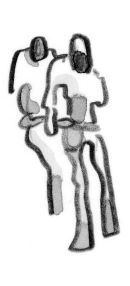 from behind, and slides the paper up under the bracelet on her wrist while throwing his other arm around her neck. He gives her a sweet grin. They hug. Then he keeps walking as the girl watches him go, lips parted, face reddening.
from behind, and slides the paper up under the bracelet on her wrist while throwing his other arm around her neck. He gives her a sweet grin. They hug. Then he keeps walking as the girl watches him go, lips parted, face reddening.

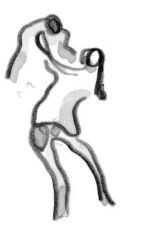
Maya has not been in school for a week. She has mono.
The vice president of the United States shot a man in the face with a shotgun in a hunting incident. It's all over the news. As if in a parallel act of violence, there was the first fight of the year at Payton. It started in the cafeteria. Somebody said something, somebody said something back. Then the first somebody, or maybe it was the second, slapped the other somebody in the face. The slappee didn't back down and the two tumbled into the atrium, a space clearing around them as if a boulder had been thrown in a bathtub. Within seconds the two somebodies were separated by security and dragged in opposite directions to tell their sides of the story, the vacuum they created slowly filling with the competing versions of the event as described by the students who had witnessed it to the students who had not.
Over the weekend, Aisha got a chocolate facial. There was a festival in Garfield Park with free chocolate, including a booth advertising the benefits of chocolate exfoliation. How could Aisha resist? She couldn't. That afternoon she felt ill, though she doesn't think it was because of the facial. Monday she stayed home and that's when she got the e-mail from Claremont.
“I thought I would be more excited,” Aisha says of her acceptance, sitting now in her library carrel. “But it was more relief.”
After taking the Claremont online tour, however, Aisha got more excited and went downstairs and told her parents.
“My mom was having a cow! My dad was like
âI don't know . . . '
and I was like
âStop it!'
So I called my brother in California and he was asleep even though it was the afternoon and I woke him up and he was like
âYeah!'
because that means he gets to use the car since I'll take it to California. Then he went back to sleep.”
âI don't know . . . '
and I was like
âStop it!'
So I called my brother in California and he was asleep even though it was the afternoon and I woke him up and he was like
âYeah!'
because that means he gets to use the car since I'll take it to California. Then he went back to sleep.”
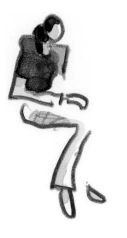
Claremont is in the same consortium of colleges as Harvey Mudd. If Aisha goes, she will be close to her brother. Aisha likes the idea of living near family. The Shaikhs are thinking of selling their house in Florida and buying one in southern California, though Aisha doesn't know if she likes the idea of living
that
near to family. Aisha's father has also been thinking of moving to Iraq because, for an engineer, there's a lot of work there now. This doesn't scare Aisha. Her father is Pakistani. She says her sisters would like to move back to the Middle East. At times, she would too.
that
near to family. Aisha's father has also been thinking of moving to Iraq because, for an engineer, there's a lot of work there now. This doesn't scare Aisha. Her father is Pakistani. She says her sisters would like to move back to the Middle East. At times, she would too.
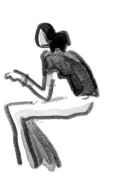
“I miss the freedom,” says Aisha, tugging at the sleeves of the University of Texas Phi Delt Fraternity T-shirt a friend from Egypt gave her.
“I had so much more freedom in Cairo,” she explains. “Didn't have a curfew. My parents are paranoid here in Chicago. There are all these restrictions here. They think it's safer over
there
. I was treated like an adult in Cairo. I could go to cafes, restaurants. ”
there
. I was treated like an adult in Cairo. I could go to cafes, restaurants. ”
Aisha straightens her Texas shirt and says, “I miss the people, the Egyptians.”
But Aisha always was aware she didn't quite belong in Egypt either. She was an outsider there as well. She belonged to a segment of Cairo, the European and Western part, and that's the part she misses. A place in between.
Aisha has started taking a class in Arabic at nearby Loyola University, since she worried her Arabic was rusty. It's keeping her busy, along with workouts for the soccer team. Last week the team ran up and down the lake in a snowstorm. The weather was stormy and wild, but they all got behind Emily Harris, the captain, and followed. Aisha doesn't know if she'll make the team, but it felt good to be getting in shape, the snow whipping in her face.
It's the city playoffs in boys' basketball, first seed Taft beating thirty-second seed Payton by seventeen points. The wooden bleachers of the Taft High School gym are packed with boys with GO TAFT written on their chests in blue, bouncing up and down and crushing nachos under their feet. The gym is tight, sweltering. The dim lighting adds to the feeling that the game is taking place in a sauna.
And yet the Grizzlies claw back. With two minutes left they're down by five. Then a steal, a three pointer, both teams rushing up and down the court, trading points. Taft misses a
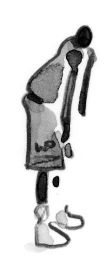 shot and with ten seconds left Payton has the chance, improbably, to win.
shot and with ten seconds left Payton has the chance, improbably, to win.

A freshman has the ball. He is wheat thin (that morning in Mr. Dyson's physics class he seemed so slender and transparent he could have been mistaken for a beaker), but on the court this afternoon he has led Payton with confident drives and deft shots, and as he slices toward the hoop it seems he is about to put the final touch on this dramatic comeback.
The path to the basket is open, then not. Three Taft defenders slam into the freshman (no referee is going to call a foul on a home team on a game's last play), but he manages to rise through them, hover a foot from the basket, and release the ball. Nothing but rim.
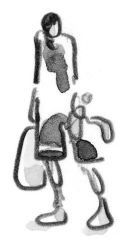
The buzzer clangs. The Taft players jump into the stands and hug their families. The Payton players gather their bags for the bus ride home.
The freshman who missed the shot talks to a local reporter. Then he sits on the bench, still in uniform. The gym empties. The only person on the court is a toddler chasing a shoe. The freshman
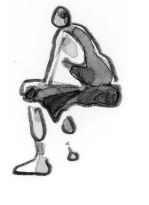 stands and jogs past the toddler to the basket and jumps into the air and lightly touches the rim, placing the imaginary ball into its rightful place.
stands and jogs past the toddler to the basket and jumps into the air and lightly touches the rim, placing the imaginary ball into its rightful place.

Other books
Me Without You by Rona Go
The Whiteness of the Whale: A Novel by David Poyer
Back to the Beach (Hunt Family Book 4) by Brooke St. James
The Jewels of Tessa Kent by Judith Krantz
The Secret Wedding Dress by Roz Denny Fox
Deadly Relations: Bester Ascendant by J. Gregory Keyes
The Slayer by Theresa Meyers
Evan Only Knows by Rhys Bowen
Dreams of the Red Phoenix by Virginia Pye